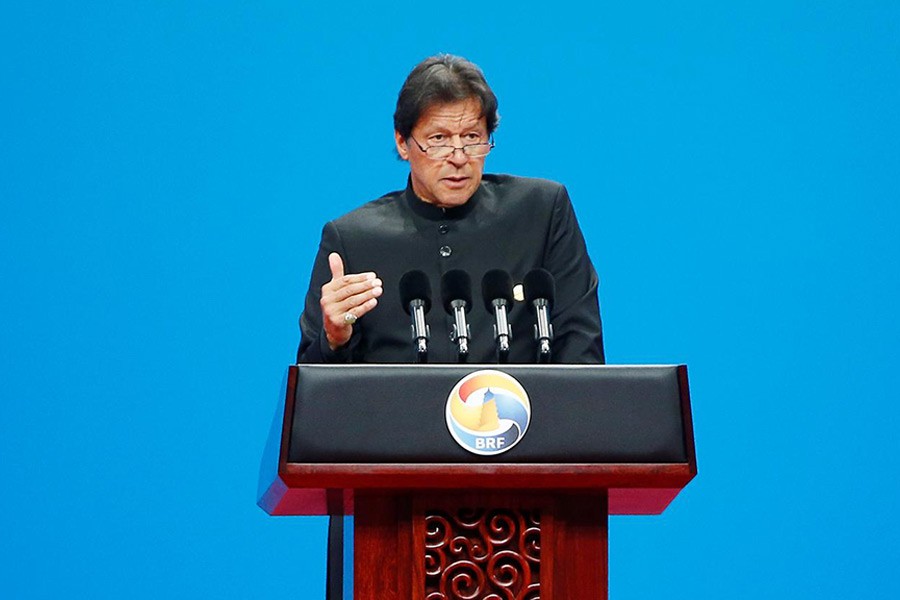Pakistan has expelled Indian High Commissioner in the wake of New Delhi's move of revoking special status for Jammu and Kashmir.
Pakistan also announced on Wednesday that it will call its ambassador back from India, report India Today, Reuters and BBC.
The decisions were taken at a second session of Pakistan's National Security Committee (NSC) presided over by Prime Minister Imran Khan to review the situation following the Indian government's move on Kashmir.
Top civil and military leadership of Pakistan also decided to downgrade diplomatic relations, suspend bilateral trade with India.
"Our ambassadors will no longer be in New Delhi and their counterparts here will also be sent back," Pakistan's Foreign Minister Shah Mahmood Qureshi said.
According to a statement issued after the meeting, Pakistan's Prime Minister Imran Khan had "directed that all diplomatic channels be activated to expose brutal Indian racist regime, design and human rights violations".
He also directed the armed forces to remain vigilant, the statement said.
A spokesman for India’s foreign ministry did not immediately respond to a request for comment.
Neighbours China and Pakistan, which both claim parts of the region, have voiced fierce opposition to India’s move dropping a constitutional provision that had allowed the country’s only Muslim-majority state to make its own laws.
Indian-administered Kashmir has been on lockdown since the Indian government decided on Monday to strip the region of its special constitutional status.
Telephone networks and the internet were cut off on Sunday evening. Tens of thousands of troops have been patrolling the streets.
The Himalayan region of Kashmir is claimed in its entirety by both India and Pakistan, but they each control only parts of it.
Instances of protest and stone-throwing have been reported despite the communications blackout and a curfew. Local leaders have also been detained.
There is a long-running separatist insurgency on the Indian side, which has led to thousands of deaths over three decades.
India accuses Pakistan of supporting insurgents but its neighbour denies this, saying it only gives moral and diplomatic support to Kashmiris who want self-determination.
The row between India and Pakistan over the disputed territory of Kashmir has deepened through Wednesday's announcement.
According to the statement of Pakistan, the NSC also decided to review bilateral arrangements and to take the matter to the UN and observe Pakistan's Independence Day on 14 August in solidarity with Kashmiris.
"Independence Day this August 14 to be observed in solidarity with brave Kashmiris and their just struggle for their right of self-determination," the statement read. "August 15 will be observed as Black Day," it added.
The meeting was attended by Defence Minister Pervez Khattak, Foreign Minister Shah Mehmood Qureshi, Chairman Joint Chiefs of Staff Committee General Zubair Hayat, Army Chief General Qamar Bajwa, Naval Chief Admiral Zafar Mehmood Abbasi, Chief of Air Staff Air Chief Marshal Mujahid Anwar Khan, ISI Director-General Lt Gen Faiz Hameed and other officials.
On Tuesday, Imran Khan, addressing a joint session of the National Assembly, had said that Pulwama-like attacks can follow the revocation of the special status for Jammu and Kashmir, which can lead to a war between India and Pakistan.
"I can already predict this will happen. They will attempt to place the blame on us again. They may strike us again, and we will strike back," the cricketer-turned-politician told his country's Parliament.
Slamming the repeal of special status to Jammu and Kashmir, Khan had called on the world to raise its voice "for the people of Indian-Administered Kashmir".
The last NSC meeting was held on 4 August to discuss India's "use of cluster ammunition to target the civilian population on the Pakistani side of Kashmir".


